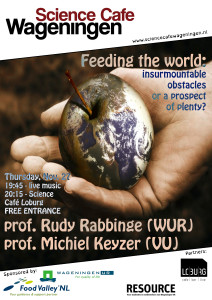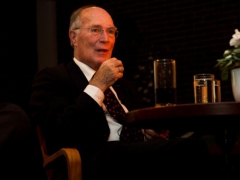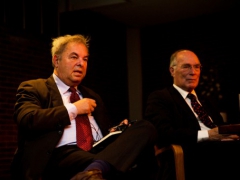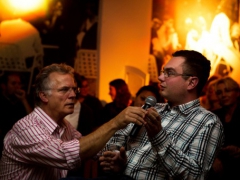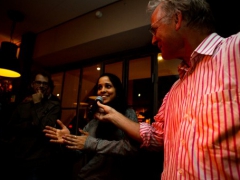Summary
Do we have enough food for the humans on this planet? How many of us still go to bed with a hungry stomach? Such were the questions addressed during this Science Cafe session “Feeding the world: insurmountable obstacles or a prospect of plenty?” held on 27th of November. Prof. Rudy Rabbinge, Emeritus Research Professor from Wageningen University started the session by delivering a talk on this existing mega-problem. He shared his experiences and views on the historical and future perspectives of agriculture, the global changes in the food demand and consumption and the various myths and prejudices among the farmers and agricultural scientists, which leads to unsustainable developments. Ensuring enough food for the growing population; access to healthy and nutritious food for everyone; adapting crop production to the changing climate and resource scarcity; and meeting the demands for food based on people’s diet preferences; are some of the main global challenges that we are facing in the field of agricultural life sciences.
According to Prof. Rabbinge, the solution exits in combining the solution spaces. Smart use of sustainable systems will be the most promising solution to this problem. Other solution include promotion of agricultural education among the farmers, increasing resource use efficiency, encouraging more research on technical sciences, protein alternatives, aquaculture and metropolitan agriculture.
Following his talk, Prof. Michiel Keyzer, emeritus professor of VU Amsterdam, delivered yet another interesting view on this problem from the eyes of a mathematical economist. According to him, the problem of skewedness of agricultural produce is not only limited to crop production but goes beyond a step to also the decreasing animal production. He says, challenges in this field are more technological and exists not at the top level. Nature, culture and human existence are the main issues. He sees hunger is just an indicator of the problem and not a problem by itself. Being a mathematical economist himself, he believes that a balance between soft power policies and hard power policies, will offer a multidisciplinary solution. Food policies at the higher level, more responsibility of public sector and people at the lower level.
Towards the end of the session there were also interesting discussions among the audience and the speakers, some debates and some take home messages. Of course, the environment lighted up more with the music from our band, Basement 4.
Presentations
20141127 Feeding the World Prof. Michiel Keyzer
20141127 Feeding the World Prof. Rudy Rabbinge
Gallery
Pictures courtesy of Tim Hofmeester
(http://www.hofmeester-natuur.nl/)

